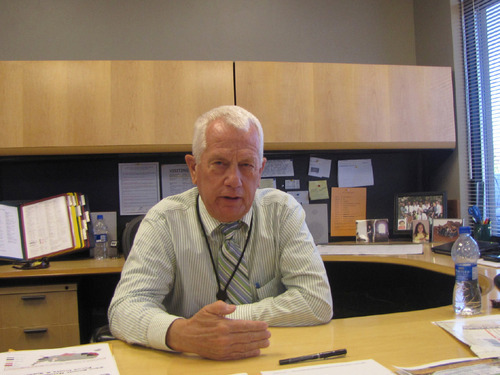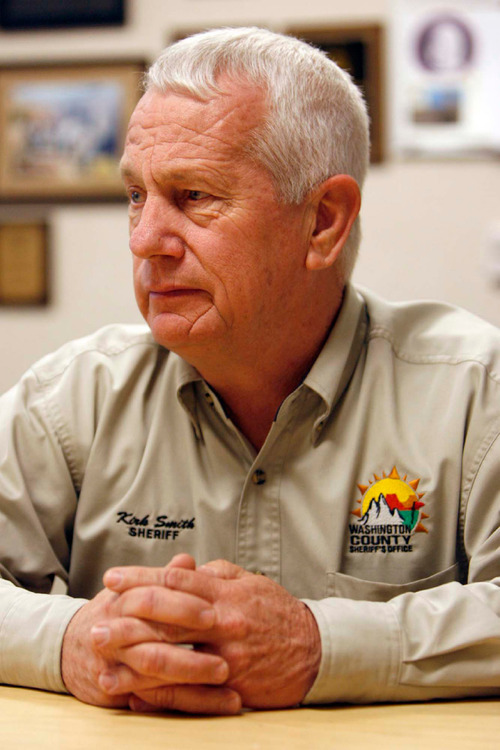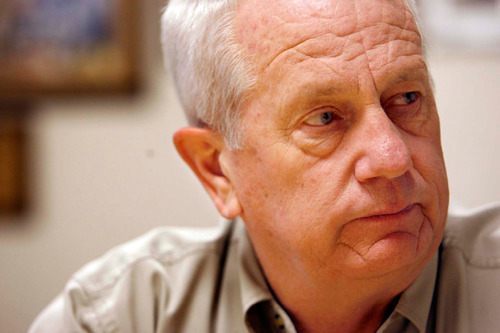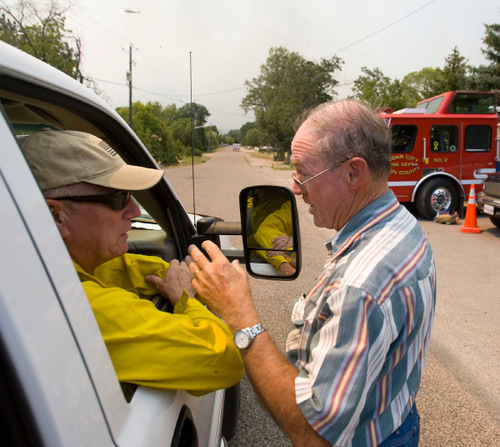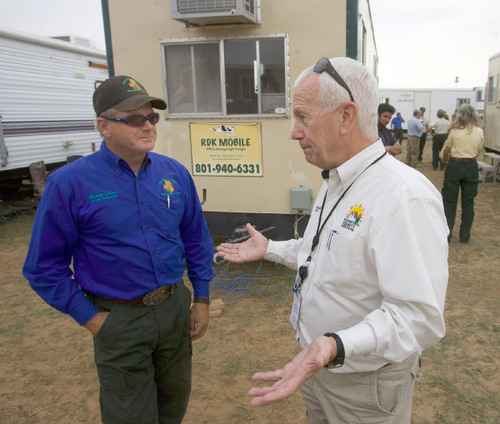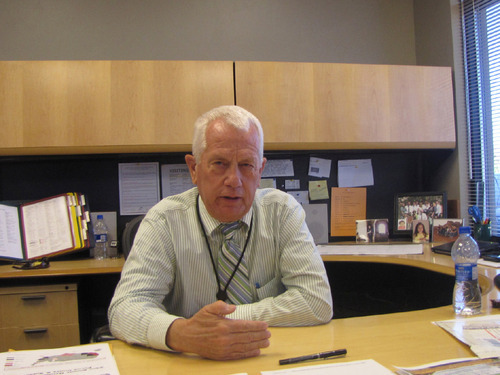This is an archived article that was published on sltrib.com in 2010, and information in the article may be outdated. It is provided only for personal research purposes and may not be reprinted.
Hurricane • Washington County Sheriff Kirk E. Smith began his law enforcement career in 1978 as a Utah Highway Patrol trooper. He was 32 and green. His training was minimal.
"They just gave me a gun and badge," Smith said. "I had a year to get certified."
Now the 64-year-old sheriff in Utah's fastest-growing county is ready to turn in that badge and gun after deciding not to run for a fourth term.
During the past three decades, Smith has been shot at by escaped convicts, overseen the destruction of sprawling pot farms, sweated under the media spotlight during Warren Jeffs' trial and survived a sex scandal involving his deputies and female jail inmates. Through it all, he's learned a lot about people. And that's the hardest thing about stepping down, he said.
"What I'll miss the most are the wonderful people I work with," he said from his office in Hurricane. "They are like family to me. I've always tried to be open and honest with people, knowing it's easiest to deal with the truth. I've also learned there are two sides to every story."
—
The low point • Smith moved to southern Utah as a Utah Highway Patrol trooper in 1983 and ran for sheriff in 1994. He lost to the Republican incumbent but tried again in 1998 as the GOP candidate and won, the first of three consecutive election day wins.
He said his biggest responsibility has always been the Purgatory Correctional Facility, where jailers on the graveyard shift formed what Smith describes as their own "little kingdom" called the "Black Sheep" and had sex with inmates.
In the end, two deputies pleaded guilty to felony and misdemeanor charges of custodial sexual misconduct, drawing jail sentences and probation. Another three resigned because they knew about the sexual activity and didn't report it.
An audit of jail procedures conducted in 2006 at the request of the sheriff and the Washington County Commission cleared Smith's office of any wrongdoing in practices or procedures.
Smith marks that as the low point of his career. He said working with his deputies is like dealing with family members — you try to teach or train them to do the right thing, but sometimes poor decisions are made.
"It cost the careers of those involved, but they did it to themselves," Smith said. "They did not live up to the code of ethics for the office."
The trial of Fundamentalist Church of Jesus Christ of Latter Day Saints leader Warren Jeffs also resulted in uncomfortable media focus on Smith and the county. "I never learned to handle the media," he said. "I'm still learning."
—
A harrowing experience • Smith was born and raised in the agricultural community of Tustin in Southern California, where his high school mascot was a farmer and students were known as Tillers.
That upbringing gave Smith a certain perspective on migrant workers, who flooded Washington County in the early part of the past decade as an influx of new residents created a booming construction industry.
Smith says immigration control is not a local issue.
"People expect so much from us but that is a matter dealt with in Washington, D.C.," Smith said. "It's frustrating."
After two tours in Vietnam, he moved to Utah in 1973 to attend Brigham Young University, where he studied political science and sociology. But the responsibilities of work and a young family kept him from finishing.
"I'm a whisker away, [from graduating] but never got around to doing it," he said.
Shortly after moving to southern Utah, Smith had the most harrowing experience of his career.
On Dec. 22, 1985, the UHP trooper was following a suspicious vehicle south of St. George on Interstate 15 into the deep lonesome of the Virgin River Gorge where communication with dispatchers is patchy at best.
He said the driver kept looking in the rearview mirror as two men who had been lying down on the back seat suddenly sprang up and opened fire on him. One had a sawed-off shotgun.
"The shots blew out the back window of their car," Smith said. "They were hanging out the windows shooting at me and at a semi truck they were trying to get to crash."
The escaped prisoners from a Delaware prison fled after wrecking their car, but were caught by a professional tracker the next day.
—
A family man • Smith's office wall is studded with photos that proclaim his off-duty passion: fishing. During the summers, he travels to Alaska, where he spends time hooking lunker salmon or halibut outside Juneau.
Many of the pictures feature family members, including youngest son Scott, 25, who has Asperger's syndrome, a type of autism, which Smith said "makes him my special guy."
One photo shows Scott holding a 12-pound catfish Smith said he hooked in the Santa Clara River.
"We were fishing for sunfish when I dropped a jig in this deep hole and caught this catfish," he said with a grin. "I never expected that."
Smith's wife, Joan, said she enjoys fishing with her husband, but usually is nestled on the bank with a book.
The couple are parents to five children, three of whom are involved in some form of police or government work, according to their mother.
Their life together has never been dull, according to Joan: When Kirk was at BYU, he took on the costumed persona of Cosmo, the school's cougar mascot. In the 1980s, he was featured on TV's "Real Stories of the Highway Patrol."
She said her husband is a good sheriff because he is resolute. "He's a unique guy who does what he thinks is right and doesn't care what media thinks or what is politically correct."
Smith said he and his wife plan to move from Santa Clara, where they now live, to the bucolic mountain community of Pine Valley after his retirement.
"I have no regrets," Smith said. "I did the best I could."


